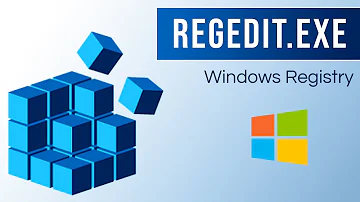What is regedit used for?
The Windows Registry Editor (regedit) is a graphical tool in the Microsoft Windows operating system (OS) that enables authorized users to view the Windows registry and make changes.
What can I do with regedit?
Regedit lets you make root-level or administrative-level changes to your computer and the configuration settings of applications that connect to the registry, so you should be very careful when using it.

What is the purpose of the registry?
The Registry contains information that Windows continually references during operation, such as profiles for each user, the applications installed on the computer and the types of documents that each can create, property sheet settings for folders and application icons, what hardware exists on the system, and the ports …
What is registry and how it works?
The registry is a hierarchical database that contains data that is critical for the operation of Windows and the applications and services that run on Windows. The data is structured in a tree format. Each node in the tree is called a key. Each key can contain both subkeys and data entries called values.
Is it safe to edit registry?
Editing your computer's registry can cause serious errors on your computer. Always create a backup before making any changes.
Are registry keys harmful?
A registry key, in and of itself, is not capable of causing harm. Neither is a computer virus. A computer virus is a specific type of a computer "program".
What is the major disadvantage of using registry in Windows?
Windows registry disadvantages are as follows: Transferring per-program user settings between Windows machines is tedious, as the Windows registry is largely dependent on the local machine.
What is the major advantage of using registry in Windows?
One major advantage of the registry is that configuration backup and restore actions involve only a small number of files in known locations. Another benefit is that administrators can use Group Policy to centrally manage program and policy settings.
Is it okay to not have a registry?
And grown-ups have been buying gifts for people without any sort of handy checklist for ages. It's totally okay to skip the registry.
Should I delete registry?
The short answer is no – don't attempt to clean the Windows Registry. The Registry is a system file that holds lots of vital information about your PC and how it works. Over time, installing programs, updating software and attaching new peripherals can all add to the Registry.
What happens when you clean registry?
Essentially, a registry cleaner is a tool that scans your Windows registry for registry keys that are of no use, or potentially leftover remnants of malware that has been removed. It then gives you the option of removing this dead weight in your system.
Is it good to clean registry?
One of the popular myths about cleaning the Registry is that it can provide a performance boost to your PC, but the truth is that doing so will have little – if any – tangible benefit. As such, we wouldn't recommend using Registry cleaners – and we'd strongly advise against ever changing things manually.
How can the Windows Registry be used maliciously?
The Windows registry can be compromised by storing malicious codes in the registry with Autorun capabilities, so that attacks refresh in the background even after a computer reboot.
How can the Windows registry be used maliciously?
The Windows registry can be compromised by storing malicious codes in the registry with Autorun capabilities, so that attacks refresh in the background even after a computer reboot.
Does registry slow down computer?
While some registry keys are absolutely critical to make sure your PC operates correctly, in fact a lot of them are duplicates. Some of your registry keys may actually be invalid, or even corrupt. These useless registry keys can slow down your computer.
How long does a registry stay active?
Traditional wedding etiquette says that guests have up to one year from your wedding day to buy a gift, so that's at least how long your registry should remain active. Even after you say "I do," make sure your registry still has options for late-gifters.
What to do if you don’t want a registry?
Here are four alternatives to consider if you don't want to create a traditional wedding registry.
- Register for experiences. …
- Register for a down payment fund. …
- Register for gift cards. …
- Register for charitable donations.
Is it safe to clean registry?
While running a registry cleaner is useless at best, it's dangerous at worst. As mentioned, the registry is home to lots of important values that both Windows and third-party programs use. If you delete, move, or damage these keys, critical system functions could fail to work.
Why is cleaning the registry important?
Registry cleaners are designed to help remove invalid references in the Windows registry which point to a resource which no longer exists on the computer. These resources may include DLLs, programs, fonts, uninstalled programs, or system information that is out of date.
How do I delete unnecessary registry files?
More Information
- Start Registry Editor (Regedit.exe).
- Locate the following key: …
- Locate the key to be deleted by locating the key name created by the program. …
- Using the Registry menu, export the selected registry key to make a backup. …
- Delete the selected registry key and its values. …
- Quit Registry Editor.
Can registry errors slow down computer?
Some of your registry keys may actually be invalid, or even corrupt. These useless registry keys can slow down your computer. Useful or not, registry keys places demands on your computer. Registry keys are hungry for space on your hard drive disk, and they can also drain valuable computing power from your PC.
What information can be collected from Windows Registry?
The registry not only keeps records of OS and application settings but it also monitors and records user-specific data in order to structure and enhance the user's experience during interactions with the system.
Can malware hide in the registry?
A malicious program could hide itself in a registry key by creating a string with a long name, which would allow the malicious string and any created after it in the same key to remain hidden, according to Secunia. Keys are stored in the Windows Registry, which saves a PC's configuration settings.
What are the two types of registry?
There are two types of the registry in the record keeping which are centralized and decentralized registries.
Can you see who views your registry?
You can see who has visited your registry and signed your Guestbook when you login to your account and hover over Settings located at the top of the page.
How do I remove unwanted files from my registry?
More Information
- Start Registry Editor (Regedit.exe).
- Locate the following key: …
- Locate the key to be deleted by locating the key name created by the program. …
- Using the Registry menu, export the selected registry key to make a backup. …
- Delete the selected registry key and its values. …
- Quit Registry Editor.


